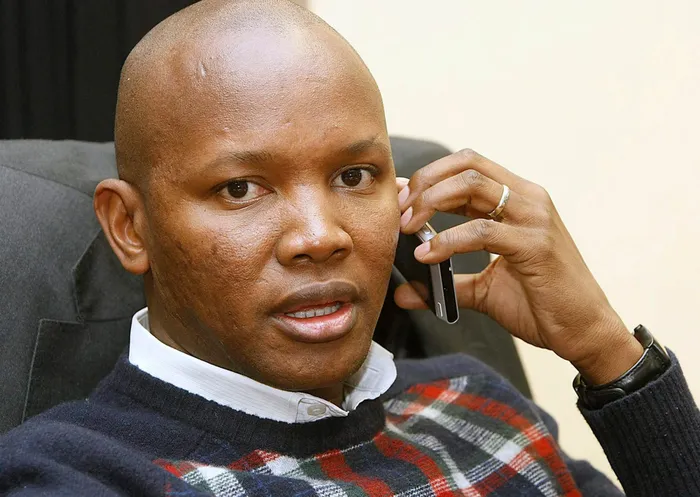Editor's Note: Please Call Me: The David and Goliath Battle has finally ended

Nkosana Kenneth Makate.
Image: File
After roughly two decades of legal warfare, public spectacle, corporate brinkmanship and constitutional detours, the long-running battle between Vodacom and Nkosana Kenneth Makate has finally come to an end in the Please Call Me battle. It is difficult to describe the moment without invoking the ancient parable that has shadowed this saga from the start: the story of a shepherd who stood before a giant armed with nothing but resolve and a sling.
In South Africa’s modern corporate arena, Makate has long been cast - fairly or unfairly -as the David to Vodacom’s Goliath, a lone idea-man challenging a telecommunications behemoth with vast legal and financial resources. With the announcement that the parties have reached an out-of-court settlement, the stone has finally landed, and the giant has stopped swinging.
It was reported that Vodacom’s board has approved the settlement agreement, although the terms remain confidential, and the matter will not return to the courts. A notice has been sent to the Supreme Court of Appeal withdrawing the operator’s appeal. “The parties are glad that finality has been reached in this regard,” Vodacom said.
What began in 2001 as a simple conversation between a young Vodacom employee and his manager would soon evolve into one of South Africa’s most enduring corporate battles. Makate, then a trainee accountant at Vodacom, shared an idea he believed could transform mobile communication — a free messaging service that would allow users without airtime to request a call-back. His superior reportedly encouraged him to develop the concept further and assured him he would be rewarded if the idea proved successful. When Vodacom launched “Please Call Me” shortly thereafter — a feature that rapidly became a cultural and commercial phenomenon — Makate expected the company to honour that verbal promise. However, this did not happen.
It spiralled into one of South Africa’s most enduring and emotionally charged corporate disputes.
Makate spent years insisting he should be paid fairly for originating the free missed-call service that became ubiquitous in the early 2000s, giving millions of South Africans a way to communicate without airtime. In the first Constitutional Court ruling in 2016, he demanded R20.2 billion, plus interest, but in later court battles said he only wanted R9.7 billion. Vodacom countered that its own assessment put his entitlement closer to R50 million. The gulf between those figures laid the foundation for a litigation marathon that traversed the High Court, the Supreme Court of Appeal (SCA) and the Constitutional Court—sometimes more than once.
The Constitutional Court’s earlier ruling requiring Vodacom to compensate Makate “fairly” was a watershed moment. But what counted as fair? The gloves were off court battles commenced.
Vodacom then appealed to the Constitutional Court again, accusing the SCA of relying too heavily on Makate’s data. The apex court criticised the SCA for failing to ensure a fair hearing, and sent the entire matter back to be heard afresh by a new panel.
And then, just as the country braced for yet another legal round, the parties stepped back from the ring.
This is where the David and Goliath analogy becomes most apt. In the biblical tale, David declares to Goliath, “You come against me with sword and spear… but I come against you in the name of the Lord Almighty.” Makate, too, approached this fight without corporate armour, without battalions of in-house counsel, and without the resources of a multinational enterprise. He fought with persistence, public sympathy, and the conviction that fairness must prevail.
But unlike the biblical story, this was never a simple morality play. Corporates do not fight with swords and spears; they fight with legal arguments, data sets, precedents and shareholder obligations. Vodacom, for its part, has always insisted it acted within contractual and commercial boundaries—and that the astronomical claims were not grounded in realistic commercial metrics.
What the settlement offers, despite the secrecy around its amount, is closure. The South African public, fatigued by years of filings and counter-filings, can now stop watching this duel unfold like an endless rerun.
And perhaps the lesson—if one must be drawn—is that giants are not invincible, and shepherds are not as powerless as they appear. But also, that after two decades, even the most compelling battles demand an end.
In the David and Goliath story, the battlefield eventually falls silent. While David triumphed over the Philistine with a sling and a stone, in South Africa’s version, the weapon was persistence, and the victoryis that the fight is finally over.

Philippa Larkin, is the executive edior of Business Report.
Image: Supplied
Business Report executive editor Philippa Larkin
BUSINESS REPORT